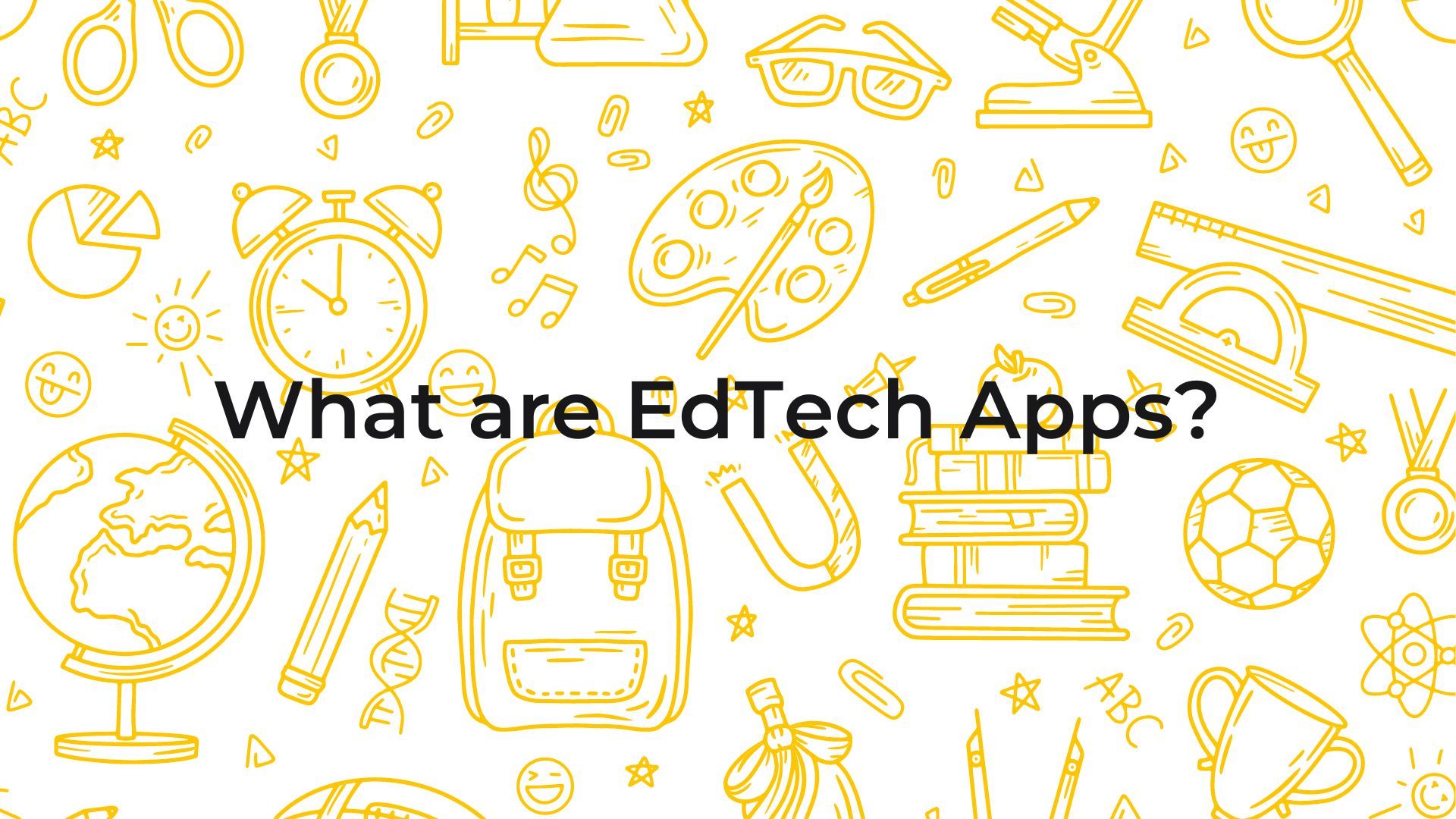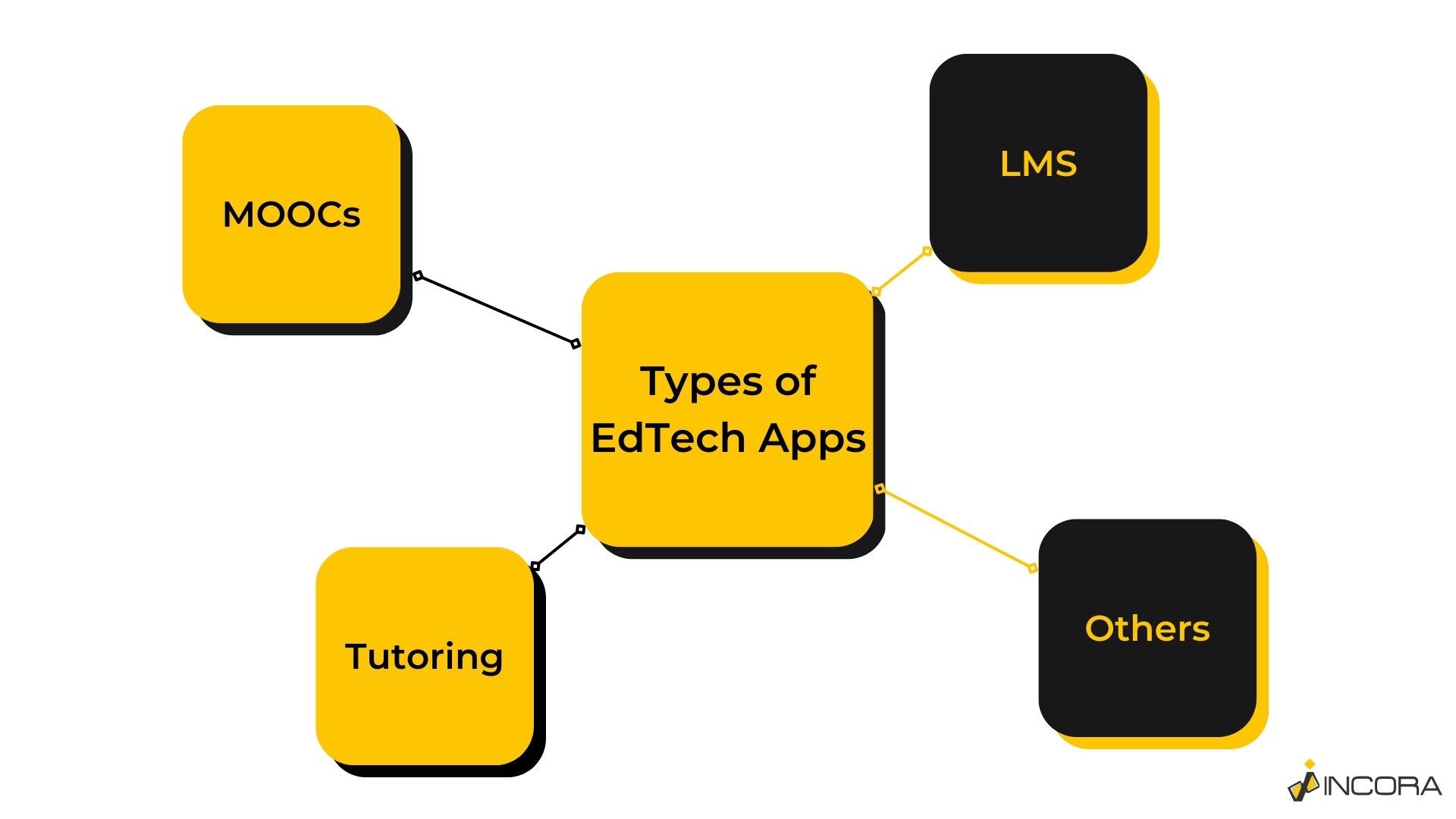EdTech
Top EdTech Apps we’ve Developed at Incora
January 19, 2023 • 384 Views • 15 min read
Bohdan Vasylkiv
CEO & Co-Founder
In the modern world, with its instability and all the challenges we all are forced to deal with, EdTech apps are growing their popularity. Frankly speaking, the combination of the educational sphere industry and various technologies is not only a requirement of time but a key feature, which can help to overcome multiple issues all around the world.

Apart from becoming a useful on-demand solution for how to keep up the pace of learning without direct contact with others during the COVID pandemic in 2020, it brings a wide range of various additional benefits for all groups of people. The pandemic significantly boosted the EdTech apps industry, due to the fact, that it was in high demand. Still, it would be unfair to state, that there were no other educational technology examples before. The most popular and famous EdTech app examples were developed far before the pandemic began. For instance, such industry giants as Udemy and Coursera were created in 2010 and 2012 accordingly.
The only distinctive quality of such tech giants, though, is that they are proposing almost the same features: mainly, they are platforms, where users can visit various courses and classes, which can be paid or free of charge. Yet, it is not the only educational apps category available. To be more specific, EdTech apps can vary, depending on various demands and proposing multiple features. For a better illustration, let’s consider some of the app examples. However, before diving into the case studies, let’s define the term itself.
EdTech Explained

As was mentioned before, EdTech apps are a combination of educational and technological industries. To make it simple, these are applications, explicitly used for educational purposes. Still, sometimes it is hard to distinguish an educational application from one, which has multiple use purposes. For instance, during the COVID pandemic and due to the need for distance learning, the Zoom app becomes extremely popular. Although it is a communicational platform, that supports group meetings and provides multiple features, for most people it is associated with online learning and various conferences.
Actually, during distance learning, a lot of various app categories were used for educational purposes. Apart from Zoom, it is possible also to name Google Meets, as well as most of the Google Cloud applications, or similar services from Microsoft like Office365.
Obviously, these applications can be used for education as well, however, they are not quite EdTech. But what functionality do EdTech applications have? Frankly, it is possible to divide app categories.
Online Courses
As the examples of Udemy and Coursera show, one of the most widespread EdTech app types is educational platforms. Usually, these are online applications, where various organizations, institutions, or individuals create planned courses on a specific topic, which consist of additional learning resources, media, lectures, and tests to complete.
Traditionally, after successful completion of the course, participants are rewarded with certificates, which confirm the successful completion of the training program. Some of such courses, as well as the completion certificates, are recognized worldwide and can become a great advantage when a participant is looking for a job. Yet, these diplomas are not an ultimate goal, but rather a pleasant bonus for engagement.
Eventually, the main objective of such platforms is to allow a large number of people to acquire new skills and share their knowledge. Therefore, such type of EdTech app is also known as Massive Online Open Courses, or simply MOOC.
Tutoring Platforms
Just like the previous option, online tutoring platforms are designed to provide an online learning experience. Nonetheless, there is one important difference between them. While online courses are targeted at a massive audience, i.e. assumed to be used by multiple people at once, the tutorship programs are aimed to create the best possible conditions for one-on-one learning.
Clearly, such platforms also can be attended by numerous people at once. Still, the learning process is individual, therefore each college student has a personal approach. As a result, these platforms have slightly different technical requirements. Mainly, apart from common features like online tests and available learning resources, such online platforms have built-in video calls and live chat functions. So, the tutor can easily contact the student in person, even if it is online only.
Mainly, such EdTech apps are used for better and more detailed learning or to improve various skills, deepen the knowledge on the topic, etc. These educational technology examples are also called adaptive learning management systems. They allow adjusting the learning pace to the student performance, highly improving the overall educational results.
Learning Management Systems
Previous online education technology examples are widespread choices of various private companies and organizations. Even if they are cooperating with different institutions like universities, or private schools, they are created and supported by private investors. Alternatively, these educational institutions are developing their private remote learning platforms, that are designed specifically for internal usage.
Such platforms are known as Learning Management Systems (LMS). Sometimes, for similar purposes, universities are using also Course Management Systems (CMS).
The functionality of these EdTech apps differs from the competitors. Clearly, the main goal for such implementations is to create an online analog of the curriculum. For example, it usually includes calendars and dashboards, online versions of a course syllabus, and personal information of the students. Moreover, access to the platform is provided by authorization with the corporate email due to the fact, that these platforms are for internal usage only and store personal information about the students.
Nowadays, it is hard to imagine a university, which has no such LMS options. This useful feature already become a must-have for most modern institutions. It creates a variety of possibilities like tracking the student’s progress, having all required resources at hand, creating tests, etc.
Sharing Incora’s Experience
Our niche-experienced developers have experience in this field, so they can propose numerous software solutions for your future project in the field of educational technologies.
We have developed various software products for the EdTech industry, including each of the foregoing types of eLearning applications and we would gladly share our experience.
Squibler
Squibler is one of our recent cases. To cut a long story short, it is hard to say, that it is fully an EdTech app. Still, it is possible to assume, that it is probably the most-suited industry to enroll this application in.
Squibler is rather a very useful digital tool, which target audience is writers. This app provides them with a user-friendly environment to help during work. In other words, it is an advanced text editor, which provides numerous handy features, apart from the editorial ones. For instance, writers can set daily goals, as well as other challenges, and the app will remind them.
Summing up the foregoing, Squibler is an all-at-once solution, designed specifically for writers. Apart from traditional online tools, Squibler can be used for various types of writing: screenwriting, novels, short stories, and books. Each category is provided with tips on how to write and inspirations. The final goal of an app is not only to make the writers’ lives easier but to help them gain new skills. This is why it can be considered a unique EdTech solution.
EduTailors
This is an example of a more common eLearning platform. EduTailors is a tutoring platform, which supports both group and individual lessons. This particular feature allows using the EdTech app not only for personal learning but can be easily suited for implementation into other digital platforms, especially LMS.
To make it simple, various educational institutions like schools or universities can adopt this platform for their eLearning purposes. As a result, teachers will be able to conduct virtual classrooms for the whole class, and if needed, they can conduct personal meetings with individual students to make the learning process more adaptive.
So, just a single feature can significantly impact the overall user experience of the whole platform. Yet, it is not the only function. EduTailors can be also used as a standard tutoring app with user-friendly user interface elements, a helpful “search” and course booking options.
UniShift
Eventually, UniShift is a modified variation of the online course platform. To rephrase it, the main feature is the ability to create and modify online courses for large groups of people, as well as enroll in these courses.
The advantage of this application over others is the ability to create public and private meetings. Thus, while most MOOCs mainly provide the participants with prewritten lectures or other materials, UniShift proposes an option to directly interact with the group. The creation of private meetings allows not only improves communication by dividing students into groups, but also gives a variety of other possibilities.
For example, teachers can make access to basic information free of charge, yet to get more options like getting additional resources, useful links, or invitations to the meetings - students will have to pay. As a result, each side wins: students can learn the basics and then decide whether they need more information, and the teacher can pay more attention to the ones, who paid for the lectures. Still, it is just a single EdTech idea, which is not the final possible way to use this platform.
Final Thoughts
Judging from our experience, we can make a few assumptions, related to the possible priorities, business risks, and challenges in the field of educational technologies, which can help you to develop one of the best EdTech startups.
Think over your education startup ideas once again. Frankly, before starting the development, consider your idea and try to create at least a brief planning and estimation. For example, if you are willing to develop a MOOC, you have to be sure that you have enough resources. At the moment, this EdTech apps category is full of possible rivals. So, to compete with others, you will need much more than a correctly working platform. Apart from it, you will need to find someone to cooperate with. For instance, Udemy and Coursera already collaborate with multiple prestige universities, professors, and lecturers. Thus, figure out what app features you will need.
One of the most effective app ideas for the eLearning sphere is tutoring. The competition in this category is also high, yet there are numerous subcategories and specialties, where you can find a starting point. Strictly speaking, we propose you start with less complex app ideas. Therefore, if you will find your place on the market, you will be able to grow in some time, getting the wished results.
Summing up all the above, you are the one to decide how to develop your application. All we can do for now is to give a piece of advice. However, if it is not enough, you can always check our case studies and look for other examples and inspirations, or directly contact us, if you already know what you are looking for.
What’s your impression after reading this?
Love it!
1
Valuable
1
Exciting
1
Unsatisfied
1
FAQ
Let us address your doubts and clarify key points from the article for better understanding.
YOU MAY ALSO LIKE
Let’s talk!
This site uses cookies to improve your user experience. Read our Privacy Policy
Accept
Share this article